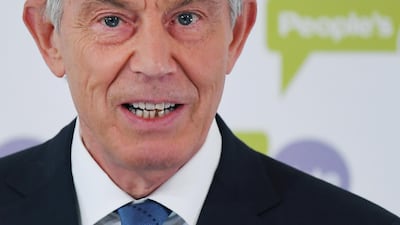The threat posed by Iran will continue to grow unless western governments learn from 40 years of failures to understand the global ambitions of the clerical regime, the think tank of former UK prime minister Tony Blair said today.
An analysis of leaders’ speeches dating back to the 1979 revolution suggests that Iran remains as committed as ever to promoting repressive governments worldwide and its anti-US sentiment was undimmed by the 2015 nuclear deal.
Western policymakers have focused on identifying moderates they can work with but have consistently overlooked the power of the ideology that underpinned the revolution 40 years ago this week, according to the institute which released two reports on Monday.
“The totalitarian and divisive worldview born from the 1979 Iranian Revolution… has been a driving force of instability and violence for years,” the Tony Blair Institute said.
“Unless Western leaders can learn the lessons from the 1979 revolution, the threat Iran poses will continue to grow.”
The report highlighted Iranian involvement in conflicts across the region, including in Syria, Yemen and Lebanon, but also as far afield as Bulgaria and Argentina.
The institute said that the West had underestimated how far Iran would go to spread its ideology.
A paper released by the institute said that the nuclear deal had been a “failure” along with other efforts of rapprochement.
US President Donald Trump described the deal as “defective at its core”. He pulled out last year and has re-imposed sanctions, citing Iran’s role in regional conflicts.
The UK government that Mr Blair used to lead said that it would join France, Germany, China, Russia and others in seeking to continue the deal in some form to prevent Iran reviving its nuclear ambitions.
But the Blair Institute report said that antipathy towards the US had become a greater focal point under Supreme Leader Ali Khamenei than it was under his processor, who first used the term the “Great Satan”.
Analysis of the speeches of Hassan Rouhani, president since 2013 and considered a moderate compared with his predecessors, showed that 60 per cent of his speeches featured explicit anti-US rhetoric.
The rhetoric has proved not to be empty with the speeches backed by billions of dollars in support for proxy groups involved in conflicts across the region, said the institute.
“We can’t afford to ignore the past 40 years and continue believing that, as long as we identify moderate regime officials to work with, the regime will moderate,” said Professor Ali Ansari, of St Andrews University, co-author of a paper released on Monday by the institute.
The four-decade anniversary of the revolution has been marked by demonstrations against the regime outside of Iran. Several thousand members of an exile group, the Mujahedeen-e-Khalq, marched through Paris on Friday, calling for an end to the regime.
The group – which has some high-profile supporters within the Trump administration – was targeted in a bomb plot by Iran last year, according to Belgian investigators.
In his State of the Union address last week, Mr Trump singled out Iran as the world’s “leading state sponsor of terror” and is hosting a conference in Warsaw this week to discuss increasing pressure on the regime.
“40 years on from the 1979 Iranian revolution, the ideology endures, more rigid and entrenched than ever before,” said Kasra Aarabi, author of the Tony Blair Institute report.
“The Western world must counter their ideology, push back against their proxies and challenge the spread of their ideas. But, most importantly, when Iranian people take to streets, they need to know they are not alone.”


